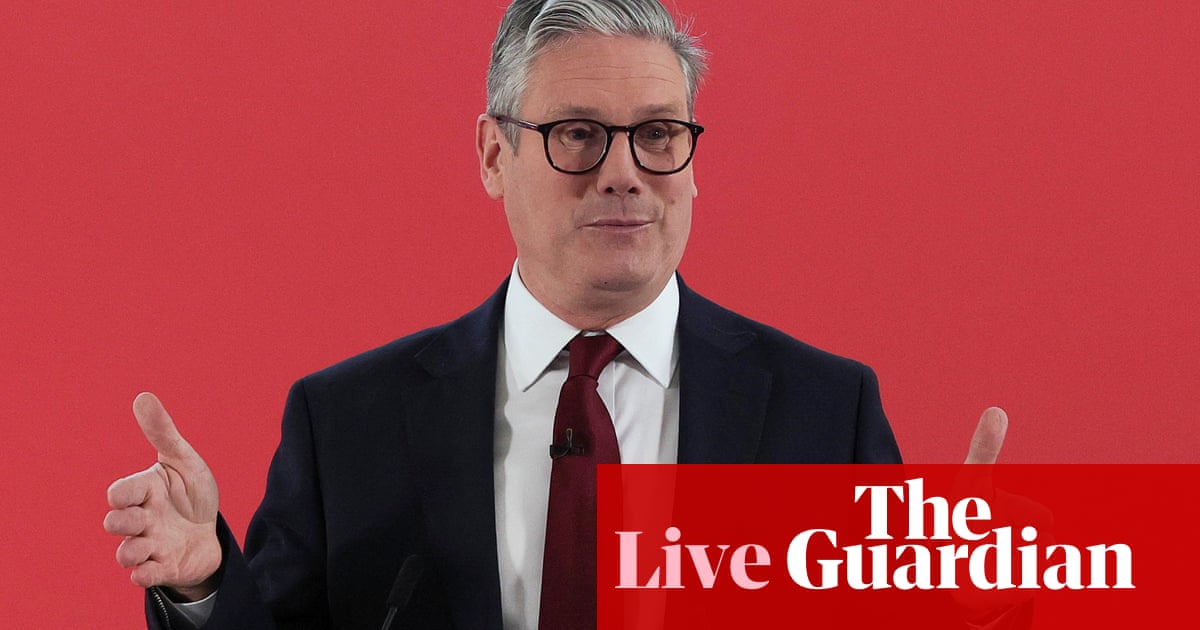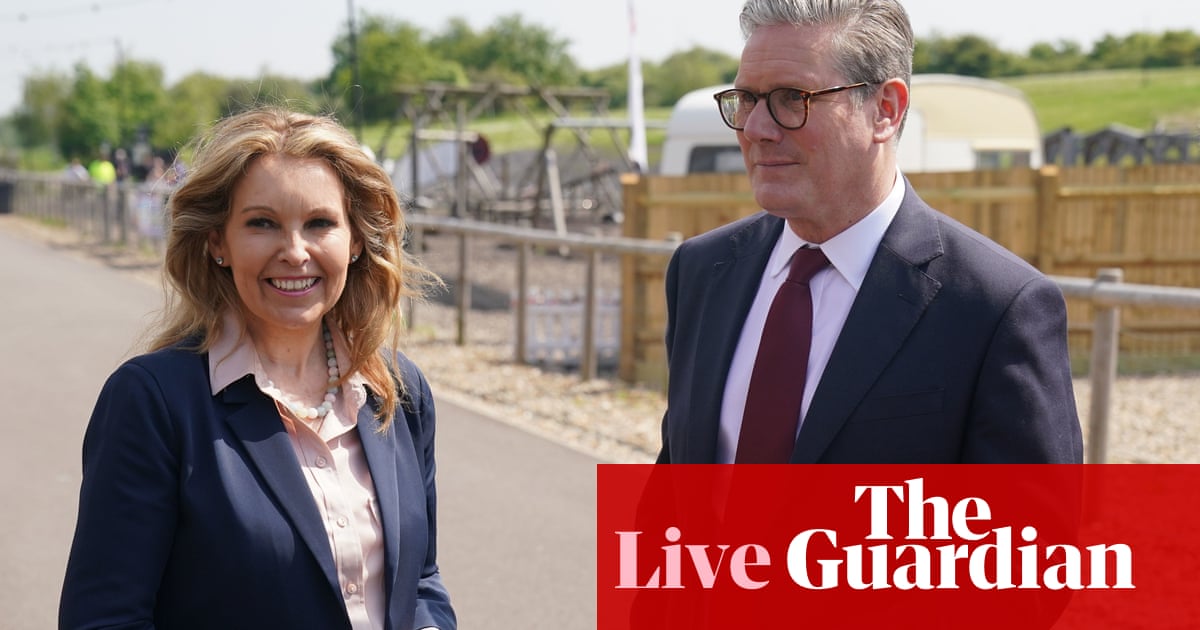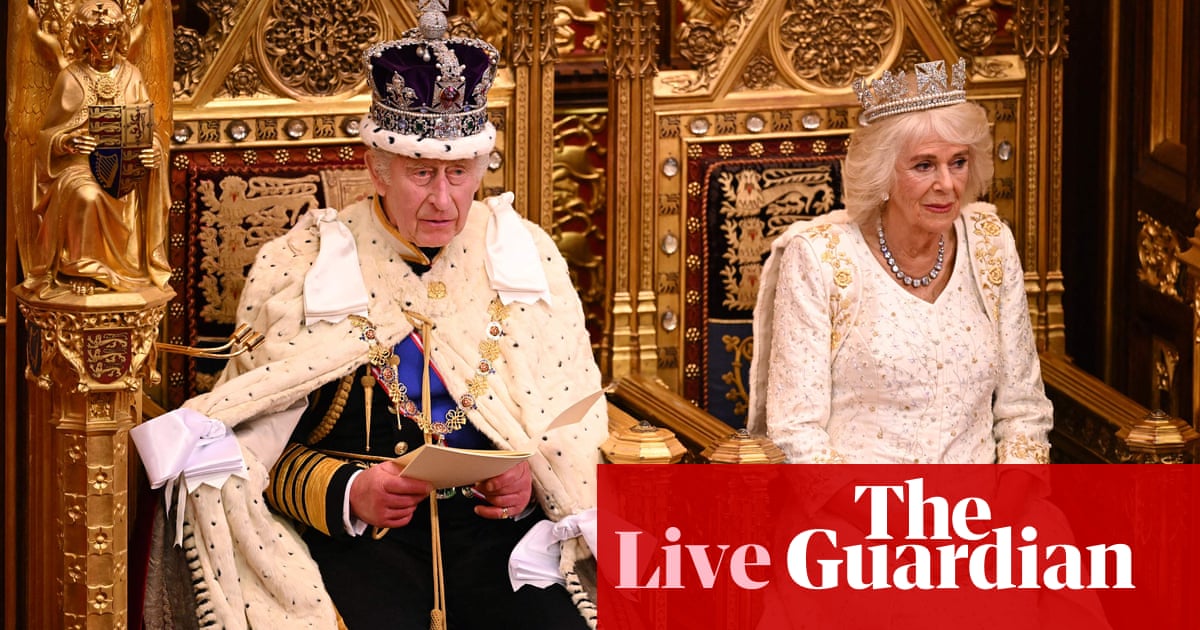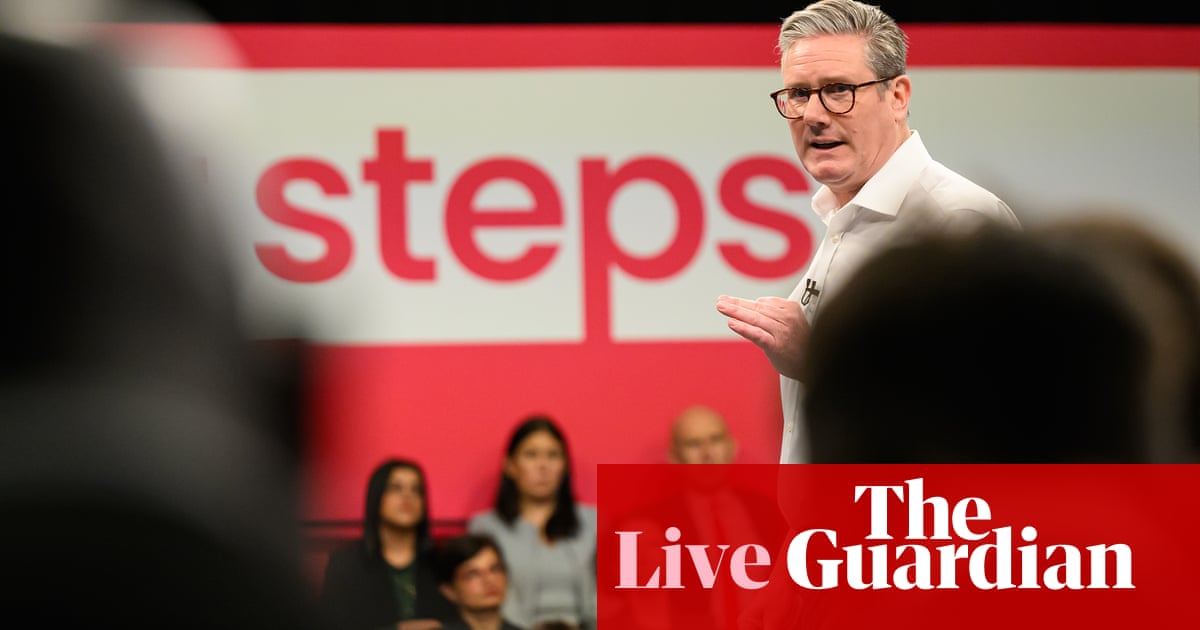
Starmer averts row with union leaders as Labour reiterates its full commitment to new deal for working people
Keir Starmer appears to have averted a row with union leaders over claims that Labour new deal for working people, its plan to beef up employment rights, was being watered down.
Some unions were set to raise concerns at a meeting this afternoon billed as a showdown.
But, as Jessica Elgot reports on X, both sides have agreed a statement expressing full commitment “to the new deal for working people as agreed in July”.
🚨Labour and the trade unions have agreed a joint statement on the workers rights proposals - coming shortly
Statement from Labour and all unions
“Together we have reiterated Labour’s full commitment to the New Deal for Working People as agreed in July.
“We will continue to work together at pace on how a Labour Government would implement it in legislation.”
Early evening summary
Keir Starmer has averted a row with union leaders about Labour’s plans to strengthen employment rights after they were satisfied by assurances they were given at a meeting that the party is not going back on pledges set out in its new deal for working people policy document last summer.
There is no evidence of widespread abuse of the UK’s graduate visa route, the government’s immigration advisers have concluded, despite repeated claims from senior Conservatives that it is being exploited to enter the jobs market.
Suella Braverman, the former home secretary, has said the Belfast high court ruling yesterday saying the Rwanda deportation policy cannot apply in Northern Ireland because of the Good Friday agreement shows that Rishi Sunak’s Windsor framework deal has “failed upon its first contact with reality”. (See 1.08pm.) During a Commons urgent question, Tom Pursglove, the minister for legal migration, claimed the court ruling would not stop the government deporting people to Rwanda and he claimed asylum seekers could not avoid removal by going to Northern Ireland. But many MPs did not accept this, and some said that, rather than just appeal against the judgment, the government should instead legislate to exempt Northern Ireland from EU law. (See 1.34pm.)
Andrew Stephenson, a health minister, has urged MPs to dismiss “myths” being spread about a World Health Organisation pandemic preparedness treaty that the UK is considering supporting. (See 2pm.)
Rishi Sunak launched his food security index to farmers, as experts predict extreme weather this year could cut UK self-sufficiency by 8%.
The Kremlin critic and anti-corruption campaigner Bill Browder has urged MPs to introduce a US-style law that would allow the government to confiscate frozen Russian assets to support military efforts in Ukraine.
Matt Wrack, general secretary of the Fire Brigades Union, is on Radio 4’s PM programme talking about the Labour/union talks, which he attended. It was “a very positive meeting"”, he says.
Q: What is the position on zero hours contracts? Will there be a clear ban?
Wrack says a lot of work has yet to be done on exactly who the policy will be implemented.
Evan Davis, the presenter, puts it to Wrack that a leaked document implied the party was watering down what had been agreed in July last year. Wrack says he will not comment on leaked documents, but he does not contest the gist of what Davis is saying.
Q: Labour know that they have you over a barrel, because you will always prefer a Labour government?
Wrack does not accept that. He says some unions are part of the Labour party, so they have a role in policymaking. And Labour won’t win without the support of unions.
And he says these policies go down “very well” with voters.
Q: But the Tories will try and scare people, by claiming it is a return to the 1970s?
Wrack says those scare stories don’t work any more, as people saw during the recent pay disputes. People can see through these tactics, he says.
And this is from LabourList on the Labour/union talks on employment rights.
One union source says: “The unions were very united at today’s talks and are happy with the outcome of the meeting.
“They will work with the Labour Party to deliver the New Deal for Working People.”
Jessica Elgot has more on the Labour meeting.
The key part of this is “AS AGREED IN JULY” - the bone of contention ahead of this meeting for the majority of trade unions was they felt the party’s language and commitments on things like fire and rehire and zero hours had changed SINCE it was signed off by them last year.
Unite and the FBU have been vocal on this - but privately the majority of affiliated trade unions thought this. Sources say it was pretty much a united front to demand the party return to the NPF’s language.
The language used in the draft given to unions had changed since it was voted on at conference - on fire and rehire it wasn’t clear if the party was still committing to legislate. On zero hours, it wasn’t clear if employers had to proactively offer a set contract.
Crucially Unite has agreed this joint statement.
That’s a big move because they did not endorse the version of the New Deal which was agreed at conference, and wanted to return to the original green paper from 2021 which was much more radical.
And Dave Ward, general secretary of the Communication Workers Union, told LBC he was happy of the outcome of the meeting about the new deal for working people, LBC’s Natasha Clark reports.
Dave Ward, General Secretary of the Communication Workers Union, says the meeting was a “positive” and “good” one
“We have reached an agreement... in terms of the full new deal, will be implemented as we agreed previously. Keir’s made it very clear how transformational that will be for working people.
“We’ve got the position we all want, Labour, working people, this will be the biggest difference in rights the country has ever seen in decades, it will be a flagship policy for the general election.
“We need to shift the balance of forces in the world of work, back towards working people, that’s the only way you’re going to grow the economy.”
And Ward posted this on X.
Good meeting with the Labour leadership. Get the Tories out and implement the new deal for workers in full.
Unite leader Sharon Graham says Labour has "listened to" unions and workers" rights plan protected
Here is more on the outcome of today’s meeting involving union leaders and the Labour party leadership to discuss the new deal for working people. (See 4.45pm.) Sharon Graham, the Unite general secretary, told LBC that the unions had been “listened to” and that the new deal for working people plan had been protected.
From my colleague Jessica Elgot
Union source said all unions presented united front in meeting and said Starmer should agree to return to language used in NPF document with no further watering down. They believe statement commits to that.
The NPF is the national policy forum.
From LBC’s Natasha Clark
After five hours of meetings about workers’ rights package, Sharon Graham of Unite says that she feels Labour have recommitted to the ‘new deal’ and it’s no longer a watered down “unrecognisable” deal
“I think that has changed... We’ve had a really good meeting, we’ve got to a good position where that was recommitted to. It was a red line meeting, but I think we’ve got there.”
Meeting will take place in another three weeks about “the implementation” of that in “a new document”
“I think we’ve been listened to and the workers’ voice heard.
“Today he’s [Keir Starmer] definitely in Labour movement direction.”
Sharon Graham tells @Fraser_Knight Labour “did listen” but she will “keep pushing” until the “words are on the page”
“We had the full team in there, they did listen. The words on the page matter, I never say we’re there until the words are on the page.... it’s still a process.”
Have they recommitted to *implementing* within the first 100 days?
“That’s a discussion that we’re having but the aim is to bring that legislation forward in the first 100 days, that’s what we expect. It’s going to be a good deal for working people.
“They have agreed to go back to the New Deal for Working People... document, use that as the principle guide and move towards legislation.”
No 10 says Esther McVey"s rainbow lanyard crackdown won"t ban officials wearing them
Downing Street has said the civil service rainbow lanyard crackdown, announced by the so-called “common sense minister” Esther McVey yesterday, won’t actually involve a ban.
In a speech yesterday, McVey, a minister in the Cabinet Office, declared:
I want a very simple but visible change to occur too – the lanyards worn to carry security passes shouldn’t be a random pick and mix, they should be a standard design reflecting that we are all members of the government delivering for the citizens of the UK. Working in the civil service is all about leaving your political views at the building entrance.
Yesterday officials said more details would be set out in guidance coming today. But at the Downing Street lobby briefing this afternoon the PM’s spokesperson said the guidance (which is still not out) was “not going to be proscriptive”. It is not going to include to ban civil servants from wearing certain types of lanyard.
The spokesperson said that, when McVey talked about rainbow lanyards being unacceptable, she was giving an “illustrative example” to make a point about impartiality, and not setting out specific policy.
Asked if the minister went too far in her speech, the spokesperson said: “No, I think the speech was bringing to life the issues she has been working on.”
This morning Grant Shapps, the defence secretary, told broadcasters he did not care whether or not his officials were wearing rainbow lanyards. (See 9.34am.)
Starmer averts row with union leaders as Labour reiterates its full commitment to new deal for working people
Keir Starmer appears to have averted a row with union leaders over claims that Labour new deal for working people, its plan to beef up employment rights, was being watered down.
Some unions were set to raise concerns at a meeting this afternoon billed as a showdown.
But, as Jessica Elgot reports on X, both sides have agreed a statement expressing full commitment “to the new deal for working people as agreed in July”.
🚨Labour and the trade unions have agreed a joint statement on the workers rights proposals - coming shortly
Statement from Labour and all unions
“Together we have reiterated Labour’s full commitment to the New Deal for Working People as agreed in July.
“We will continue to work together at pace on how a Labour Government would implement it in legislation.”
New drone-carrying ships for the Royal Marines will draw on lessons learned from the Ukraine war and the Houthi attacks on vessels in the Red Sea, Grant Shapps said.
As PA Media reports, the defence secretary confirmed that up to six multi-role support ships (MRSS) – designed to deliver commandos onto coastlines around the world to conduct special operations – would be built.
Shapps said “we will definitely build the first three” vessels for the Royal Marines and will plan to construct the next three. “What we’re trying to do is create a multi-role ship which they can use in all different circumstances,” he told the BBC.
Actually, interestingly, we’re learning from what’s happened in the Black Sea in Ukraine and learning what’s happening in the Red Sea currently to make much more flexible ships capable of carrying out a lot of different types of tasks.
Shapps gave more details of the MoD’s shipbuilding programme in a speech this morning. He said up to 28 ships and submarines were in the pipeline.
Scottish Labour leader Anas Sarwar says he would not accept Natalie Elphicke as candidate for his party
Anas Sarwar, the Scottish Labour leader, has said Natalie Elphicke would not be welcome in the Scottish Labour party.
Elphicke, a rightwing Conservative until her surprise defection last week, is now a member of the Labour party and sits on the Labour benches at Westminster.
But, as the National reports, Sarwar told the BBC’s Good Morning Scotland programme today that he regarded some of the things she has said in the past as unacceptable. Asked about her defection, he said:
Look, I don’t know Natalie Elphicke, I’ve never met Natalie Elphicke. Looking at some of the comments that have been attributed to her or that she has said, I find them completely unacceptable, I don’t agree with them.
Asked if she would have been allowed to join Scottish Labour, he replied:
Well, look, she certainly wouldn’t be a Scottish Labour candidate, I can be really clear about that.
Asked if he thought it was right for her to be a Labour MP, Sarwar said that she would only be a Labour MP for “a matter of weeks” because the election was coming soon.
Michelle O"Neill rejects suggestion she was "hypocritcal" when she criticised Boris Johnson over Partygate rule breaking
Michelle O’Neill, Northern Ireland’s first minister, was accused of being “hypocritcal” at the Covid inquiry hearing today because she criticised Boris Johnson for breaking lockdown rules while she seemed to ignore them herself when she attended an IRA funeral.
Near the start today’s hearing O’Neill said she was “truly sorry” for attending the outdoors event in June 2020, where an estimated 1,800 people gathered at a time when funerals were only supposed to be attended by 30 people. (See 10.52pm.)
Heather Hallett, the inquiry chair, put it to O’Neill that it was hypocritical for her to criticise Boris Johnson for breaking lockdown rules when she had done the same herself.
O’Neill replied:
I don’t think so because they are two very different things in terms of the Boris Johnson approach of partying the whole way through the pandemic and drinking their way through it, to be quite blunt.
Hallett tried again.
We didn’t find out about the partying until after the pandemic, what you did was to do something the normal bereaved couldn’t do because you wanted to go to a friend’s funeral. Isn’t saying that what Boris Johnson’s government did was wrong sort of hypocritical?
O’Neill replied:
No, I don’t think so because what I did I did under the understanding of the regulations at that time. But I do accept wholeheartedly that I in some way damaged our executive relations with colleagues who had been working very hard with me the whole way through.
I also accept wholeheartedly that I damaged the public health messaging, and I had work to do to regain that. But I did that, I worked hard to regain that trust and confidence and to lead us for the next year and a half through the pandemic.
Hallett said she was pressing the point because “the point of principle is that those who set the rules should obey the rules, both in spirit and in the letter”.
O’Neill said she should have “anticipated the outworking of what I did”. But she said the attended the funeral with a personal invitation, as part of a cortege of 30 people.
That’s the basis on which I attended but I am sorry, I am sorry. I should have anticipated what would happen in the aftermath and that is why I worked hard to try to regain that confidence and trust.
Equally and more importantly, I think it’s about all the families of bereaved and people who went through horrific circumstance and the experience that they’ve had. It’s just horrendous and I would never set out to try to compound that or in any way make it more difficult for them to deal with their grief.
And Suella Braverman, the former home secretary, told MPs during the UQ on the WHO treaty that she did not trust the WHO to manage a global pandemic. She said:
I am profoundly sceptical of the World Health Organisation’s ability to manage a global pandemic in light of serious errors of judgment, poor leadership and, I’m afraid, well-chronicled conflicts of interests which have subsequently emerged.
Of course, we can help poorer countries. Of course, we can collaborate with other nations, but under no circumstances must we surrender our sovereignty or sign up to a lockdown charter.
Will the minster agree that fundamentally, and to coin a phrase, no pandemic treaty is better than a bad pandemic treaty?
Andrew Stephenson, the health minister, said that he agreed “100%” that no treaty was better than a bad treaty. But he said it was Boris Johnson who originally led calls for a new WHO treaty covering pandemics when he was PM. Stephenson went on:
And the reason behind that is we believe that commitment on stronger international collaboration and cooperation on global health are crucial to secure the UK’s health and economic security, but domestic decisions still have to be left to sovereign nation states to take the right decisions for their country.












